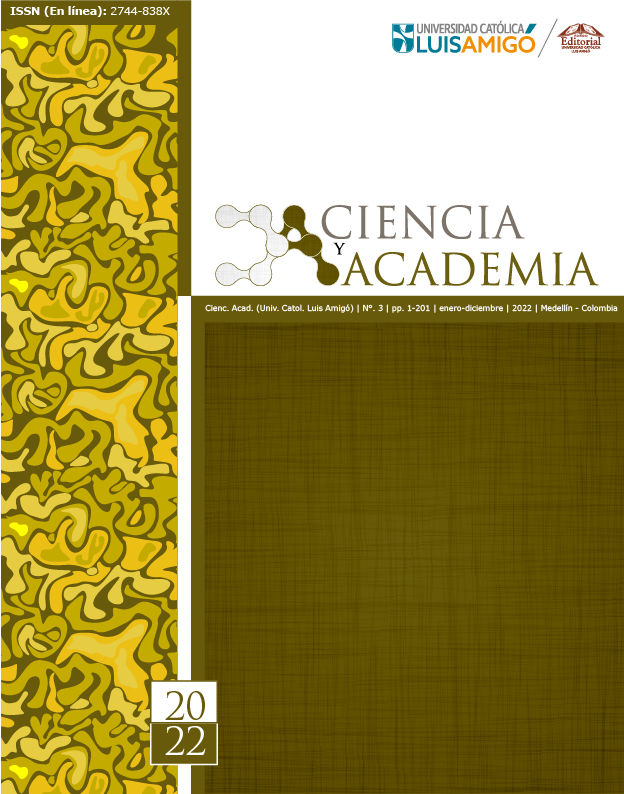Psychosocial and organizational factors generated by the COVID-19 in the collaborators of the optical sector in the city of Medellín
DOI:
https://doi.org/10.21501/2744838X.4491Abstract
The objective of this article was to determine the psychosocial and organizational effects generated by Covid-19 in the collaborators of an optician in the city of Medellín. The methodology chosen for this article is the quantitative approach, with an exploratory design, the instrument used was a survey applied to 16 collaborators. Among the results, a high prevalence of physical and psychological symptoms was found, such as headache, gastritis, sleeping difficulties, stress, anxiety, constant worries and fear of contagion; In addition, many lost part of their income, few were fully supported, and very few had other sources of income. It is concluded that the collaborators of this company were negatively affected, not only in health, but also in motivation, which reduces the quality of work life and generates difficulties in achieving the same degree of productivity as before the pandemic.
Downloads
References
Apaza P., C. M., Seminario Sanz, R. S., & Santa-Cruz Arévalo, J. E. (2020). Factores psicosociales durante el confinamiento por el Covid-19 – Perú. Revista Venezolana de Gerencia, 25(90), 402-413. https://doi.org/10.37960/rvg.v25i90.32385
Arias-Pineda, A. A., & Ramirez-Martinez, L. (2019). La organización-empresa: ¿un sistema vivo? Aportes de la teoría de la complejidad y la filosofía ambiental a la teoría administrativa y organizacional. Revista Escuela De Administración de Negocios, (86), 133–150. https://doi.org/10.21158/01208160.n86.2019.2298
Buitrago Ramírez, F., Ciurana Misol, R., Fernández Alonso, M., & Tizón García, J. (2020). Salud mental en epidemias: una perspectiva desde la Atención Primaria de Salud española. Atención Primaria, 52(2), 93-113. https://doi.org/10.1016/j.aprim.2020.09.004Burbano, A. (2017). Importancia de la dirección estratégica para el desarrollo empresarial. Dominio de las Ciencias, 3(3), 19-28. http://dx.doi.org/10.23857/dc.v3i3%20mon.621Briones-
Jácome, I. E. (2020). Psicología organizacional en tiempos de la pandemia COVID-19. Dominio de las Ciencias, 6(3), 26-34. https://dominiodelasciencias.com/ojs/index.php/es/article/view/1272/html
Castañeda Herrera Y., Betancur J., Salazar Jiménez N. L., & Mora Martínez A. (2017). Bienestar laboral y salud mental en las organizaciones. Revista Electrónica Psyconex, 9(14), 1-13. https://revistas.udea.edu.co/index.php/Psyconex/article/view/328547
Cifuentes-Avellaneda, Á., Rivera-Montero, D., Vera-Gil, C., Murad-Rivera, R., Sánchez, S.M., Castaño, L.M., Royo, M., y Rivillas-García, J. (2020). Ansiedad, depresión y miedo: impulsores de la mala salud mental durante el distanciamiento físico en Colombia [Informe No. 3]. Asociación Profamilia. http://dx.doi.org/10.13140/RG.2.2.32144.64002
Escudero Macluf, J., Delfín Beltrán, L. A., & Arano Chávez, R. M. (2014). El desarrollo organizacional y la resistencia al cambio en las organizaciones. Revista Ciencia Administrativa, (1), 1-9. http://www.uv.mx/iiesca/files/2014/09/01CA201401.pdf
Gómez Vélez, M. A. (2016). Sobre la psicología organizacional y del trabajo en Colombia. Revista Colombiana de Ciencias Sociales, 7(1), 131-153. https://doi.org/10.21501/22161201.1438
Hernández, R., Fernández, C., & Baptista, P. (2017). Metodología de la investigación. Mc Graw Hill.
Hermosa R., A. M., & Perilla T., L. E. (2015). Retos investigativos en psicología de la salud ocupacional: el estrés laboral. Revista Facultad Nacional de Salud Pública, 33(2), 252-261. https://doi.org/10.17533/udea.rfnsp.v33n2a12
Lozano-Vargas, A. (2020). Impacto de la epidemia del Coronavirus (COVID-19) en la salud mental del personal de salud y en la población general de China. Revista de Neuro-Psiquiatría, 83(1), 51-56. https://doi.org/10.20453/rnp.v83i1.3687
Mero-Vélez, J. M. (2018). Empresa, administración y proceso administrativo. Revista Científica FIPCAEC, 3(8), 84-102. https://doi.org/10.23857/fipcaec.v3i8.59
Neffa, J. C. (2015). Los riesgos psicosociales en el trabajo: contribución a su estudio. CEIL-CONICET. http://www.ceil-conicet.gov.ar/wp-content/uploads/2015/11/Neffa-Riesgos-psicosociales-trabajo.pdf
Patlán Pérez, J. (2019). ¿Qué es el estrés laboral y cómo medirlo? Revista Salud Uninorte, 35(1), 156-184. https://doi.org/10.14482/sun.35.1.158.72
Quintero Arango, L., F., & Betancur Arias, J., D. (2021). Factores para el diseño de políticas de salario emocional. Fondo Editorial Universidad Católica Luis Amigó. https://doi.org/10.21501/9789588943640
Rodríguez Fernández, A., Díaz Bretones, F., Fuertes Martínez, F., Martín Quirós, M. A., Montalbán Peregrín, M., Sánchez Santa-Bárbara, E. & Zarco Martín, V. (2004) La psicología de las organizaciones. Editorial UOC. https://www.academia.edu/43470915/Psicolog%C3%ADa_de_las_organizaciones
Sanoja Capote, F. (2021). La gestión del cambio organizacional: Una estrategia empresarial necesaria en una sociedad digital luego del COVID-19. Revista Global Negotium, 4(2), 92-107. https://doi.org/10.53485/rgn.v4i2.171
Sarsosa-Prowesk, K., & Charria-Ortiz, V. (2018). Estrés laboral en personal asistencial de cuatro instituciones de salud nivel III de Cali, Colombia. Universidad y Salud, 20(1), 44-52. https://doi.org/10.22267/rus.182001.108
Velásquez, M. (2012). La salud mental de las y los trabajadores. Observatorio Vasco de Acoso Moral. https://www.osalan.euskadi.eus/contenidos/libro/medicina_201320/es_saludmen/adjuntos/salud_mental_trabajadores.pdf
Published
How to Cite
Issue
Section
License
Copyright (c) 2022 Ciencia y Academia

This work is licensed under a Creative Commons Attribution-NoDerivatives 4.0 International License.
La revista y los textos individuales que en esta se divulgan están protegidos por las leyes de copyright y por los términos y condiciones de la Licencia Creative Commons Atribución-No Comercial- 4.0 Internacional. Permisos que vayan más allá de lo cubierto por esta licencia pueden encontrarse en http://www.funlam.edu.co/modules/fondoeditorial/






